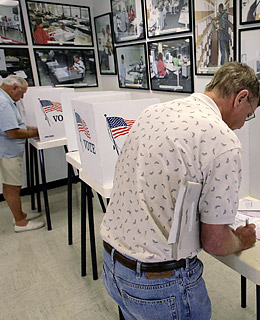
"Joe the plumber" is not registered to vote. Or at least he is not registered under his own name. The man known to his mother as Samuel Joseph Wurzelbacher, who has become a feature of John McCain's stump speech, is inscribed in Ohio's Lucas County registration records as "Worzelbacher," a problem of penmanship more than anything else. "You can't read his signature to tell if it is an o or a u," explains Linda Howe, the local elections director.
Such mistakes riddle the nation's voting rolls, but they did not matter much before computers digitized records. The misspelled Joes of America still got their ballots. But after the voting debacle in 2000, Congress required each state to create a single voter database, which could then be matched with other data, such as driver's licenses, to detect false registrations, dead people and those who have moved or become "inactive." In the marble halls of Congress, this sounded like a great idea — solve old problems with new technology. But in the hands of sometimes inept or partisan state officials, the database matches have become a practical nightmare that experts fear could disenfranchise thousands.
In Wisconsin, an August check of a new voter-registration database against other state records turned up a 22% match-failure rate. Around the time four of the six former judges who oversee state elections could not be matched with state driver's license data, the board decided to suspend any database purges of new registrants. But database-matching continues elsewhere. In Florida, nearly 9,000 new registrants have been flagged through the state's "No Match, No Vote" law. (Their votes will not be counted unless they prove their identity to a state worker in the coming weeks.) In Ohio, Republicans have repeatedly gone to court to make public a list of more than 200,000 unmatched registrations, presumably so that those voters can be challenged at the polls, even though most of them, like Joe, are probably legit. "It's disenfranchisement by typo," explains Michael Waldman, executive director of the Brennan Center for Justice, which tracks voting issues.
Elsewhere the purges are peremptory. A county official in Georgia this year removed 700 people from voter lists, even though some of those people had never received so much as a parking ticket. Another Georgia voter purge, which seeks to remove illegal immigrants from the rolls, has been challenged by voting-rights groups that say legal voters have been intimidated by repeated requests to prove their citizenship. Back in Mississippi last March, an election official wrongly purged 10,000 people from the voting rolls — including a Republican congressional candidate — while using her home computer. (The names were restored before the primary.)
With just days until the election, the scale of the database-purge problem is unknown. Millions have been stripped from voter rolls in key states, but the legitimacy of those eliminations remains unclear. The sheer volume of state voter checks against the federal Social Security Administration database, however, has raised concerns. Six states that are heavily using the federal database were recently warned by Social Security commissioner Michael Astrue about the danger of improperly blocking legitimate voters. "It is absolutely essential that people entitled to register to vote are allowed to do so," he said in October.